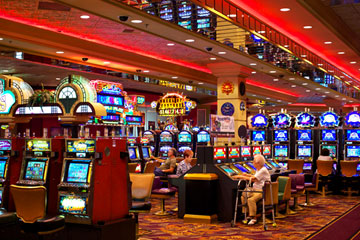
Las Vegas local, Eleanor Kochanski, center right, plays one cent machines in the Penny Lane area of The Orleans casino, in Las Vegas on Wednesday, June 26, 2013.
It looks to be a reasonably busy weekday evening at the Wynn Resort on the Las Vegas Strip. Asian tourists stop in its beautiful atrium entrance to have their photos taken among the flower sculptures and trees that mark its opulence. On the casino floor there's a gang of Google conventioneers surrounding a craps table, enthusiastically conducting a search for a seven. Yet the high-stakes baccarat and slot rooms are largely empty, and dealers stand as still as the topiary behind vacant $100-minimum tables. At the other end of the risk scale, the Wynn's table minimums have drifted down to $10 or $15. Still too much for you? Everywhere in Las Vegas there are slot machines that allow you to plunk down a penny a spin. Go ahead, let it ride.
Or don't. Four years after the end of the Great Recession, tourists have returned to Vegas in full force--but they are more apt to let it ride on a roller coaster than on a roulette wheel. The Las Vegas Convention and Visitors Authority clocked in 39.7 million visitors last year, eclipsing the 2007 record. Last year's gross gambling revenue in Clark County, Nevada, which includes Las Vegas, totaled $9.4 billion. That's a lot of wagering, but it's about 13% less than the $10.6 billion bet in 2006--by a like number of visitors. While the rest of the economy is back to even--and autos and housing are going flat out--Vegas is still down a billion and change. "In pure economic terms, it's a fair argument to say there's been a shift in the demand curve of gambling activity," says Jeremy Aguero, a consultant with Applied Analysis and a board member at Nevada State Bank.
Five years ago, when the economy caved in, consumers naturally pulled back their willingness to risk, which is a particular problem for a city that thrives on the optimism of a blackjack player hitting on 16. The big question for Vegas is whether this risk aversion is an extended hangover--in a city well known for them--from the financial meltdown or a more permanent feature of the new normal. Since gambling represents the biggest chunk of revenue and profit for casino owners, "its recovery is crucial for the recovery of the Strip," according to a recent report by Moody's. The analysts don't see that happening for at least another year. The most recent quarterly earnings reports from Caesars Entertainment and Wynn Resorts, which both failed to meet expectations, reflect the difficulty of getting people to gamble like it's 2006.
Las Vegas' situation might now be raising a broader economic issue. If we can't let loose with money there, does it mean that a nation raised on risk--from gold-seeking Forty-Niners to Texas wildcatters to Wall Street arbitrageurs--has lost its appetite? Banks have been criticized for refusing to let go of the money. Corporations have trillions of dollars sitting on balance sheets because they're wary of taking on too big an investment risk. Tourists, too, seem to be having a hard time letting go.
